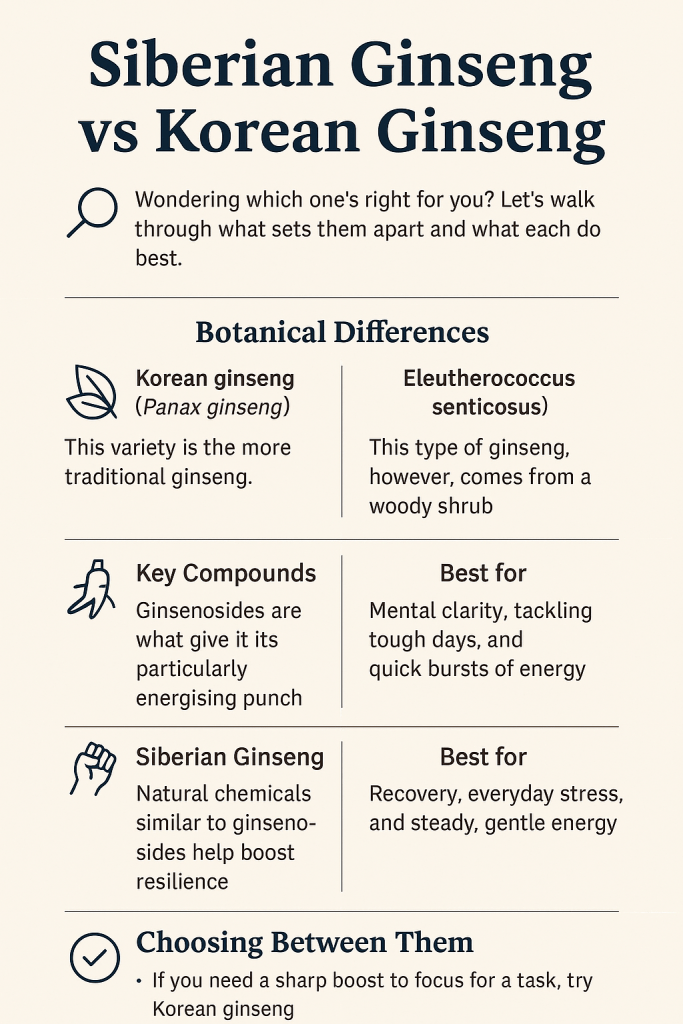🧠 Siberian Ginseng vs Korean Ginseng
If you’ve ever stood in front of a supplement shelf wondering which ginseng to grab — you’re not alone. The battle of Siberian ginseng vs Korean ginseng has sparked more than a few debates in the natural health world. But the truth is, they’re not the same plant at all — and each has its own unique strengths.
Let’s unpack what each one offers, how they stand apart, and when you might lean towards one over the other.
🌿 What Is Ginseng, Really?
While both wear the ginseng name, only Korean ginseng — also called Panax ginseng — falls into the ‘true’ ginseng category. Siberian ginseng comes from a hardy shrub known as Eleutherococcus senticosus, which thrives in colder climates. Though related in a loose botanical sense, it’s not a true ginseng — it simply mimics some of the same effects.
That said, both have long-standing roots (pun intended) in traditional medicine, and they’re both known as adaptogens — natural substances that help the body handle stress. Research continues.
⚡ Korean Ginseng: The Energy Booster
Korean ginseng steps up your physical and mental game in a big way. People often turn to it for:
- Increasing energy and stamina
- Supporting cognitive function
- Enhancing immune response
You’ll find its strength in ginsenosides — natural plant compounds that support stamina, focus, and immune health.
Best for: Athletes, professionals under pressure, and anyone needing a sharp mental edge.
Tip: Look for red Korean ginseng — it’s steamed and dried, which increases potency.
🌲 Siberian Ginseng: The Gentle Warrior
In contrast, Siberian ginseng takes a slower approach. It gradually helps build your body’s resilience instead of giving an instant lift. People use it to:
- Reduce fatigue
- Support adrenal health
- Strengthen the immune system
It contains eleutherosides instead of ginsenosides. They’re known to support your system’s ability to recover and adapt to daily stressors.
Best for: People looking to recharge gradually and manage everyday stress without overstimulation.
Tip: Ideal during times of immune stress or burnout — it doesn’t overstimulate.
⚔️ Siberian Ginseng vs Korean Ginseng: Key Differences
| Feature | Korean Ginseng (Panax) | Siberian Ginseng (Eleuthero) |
|---|---|---|
| Classification | True ginseng | Not a true ginseng |
| Main active compounds | Ginsenosides | Eleutherosides |
| Energy effect | Fast-acting boost | Gradual, long-term support |
| Ideal use case | Performance, focus, vitality | Recovery, stress resilience |
| Common side effects | Can overstimulate | Generally very well tolerated |
🤔 Which One Should You Choose?
Choosing between Siberian ginseng vs Korean ginseng depends on your goal. Got a deadline breathing down your neck? Korean ginseng gives you that mental nudge when the pressure’s on and focus is key. When you’re recovering or simply want to build yourself back up at your own pace, Siberian ginseng offers steady support.
Some people rotate both depending on the season or how busy life gets — Korean ginseng when you’re under pressure, and Siberian ginseng when you’re recharging.
🔄 Can You Take Them Together?
You can, sure — but it’s wise to go easy. Since both affect energy and stress levels, combining them might feel like too much. Start with one, and see how your body responds before adding the other.
📝 The Takeaway
So then, where does that leave us in the Siberian ginseng vs Korean ginseng debate?
No clear winner here — just the one that lines up with what your body and mind need most. Korean ginseng gives you that sharp lift when you need it, while Siberian ginseng quietly builds your resilience over time. Each one earns its spot in your natural health kit — it just depends on what kind of support you’re after.
We hope you liked this different take on the varied species of this truly great Herb. If you’re curious to dive deeper into related topics, these articles might be right up your alley:





